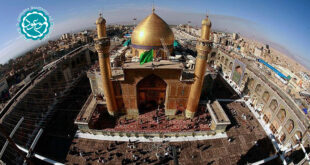Several proofs from the Qur’an
1. Ta’wīl of the deeds of Khidr (‘a): In the story of Moses (‘a) and Khidr (‘a) the word ta’wīl is used where Khidr tells Moses:
“I will soon inform you of the ta’wīl of that for which you could not bear patience.”13
And at the end of the narration he says:
“This is the ta’wīl of that for which you could not bear patience.”14
Now we will examine the account to understand the meaning of ta’wīl. Khidr (‘a) did three things that according to Moses (‘a) did not seem right and he protested:
“When they embarked upon the boat, he made a hole in it…”15
“When they met a young man he slew him…”16
“When they came to the people of a town, they asked them for food but they refused them hospitality. They came to a wall that was close to falling down and he repaired it…”17
These were acts that Khidr (‘a) performed and Moses (‘a) protested each of them. That is to say, the semblance that Moses perceived for these deeds were as follows:
“Did you make a hole in the boat to drown its passengers? Thou has indeed done a dreadful thing.”18
“Have you killed an innocent person and that not for retaliation against a person slain? Thou has indeed done a horrible thing.”19
“If you wanted, you could have taken payment for it.”20
Clearly Moses (‘a) objects to the deeds of Khidr (‘a) because they do not have appropriate outward appearances.
Now, let us examine the ta’wīl of Khidr (‘a), that is, the true and good aspects and designations of these deeds:
“As for the boat, it belonged to some poor people who worked upon the sea. I intended to mar it because there was a king before them who seized every ship by force.”21
“As for the young man, his parents were people of faith. I feared that he would impose upon them rebellion and disbelief. Thus I intended that their Lord give to them in exchange a son better than him in purity and closer in affection.”22
“As for the wall, it belonged to two orphan boys in the city. Beneath the wall there was a treasure cache belonging to them and their father had been a righteous man. So your Lord intended that they become full adults and unearth their treasure as a blessing from your Lord.”23
After Khidr (‘a) gave his answers for each of his deeds, he gave another comprehensive answer for all the criticisms of Moses (‘a):
“And I did not do these things willfully…”24
As my dear readers see, the meaning of ta’wīl in these verses is for everything to be referred to its own aspect and designation and to realize its true significance. For instance the word ‘zadan’ in Farsi designates chastisement however ‘rag zadan’ signifies the aspect of medical treatment.
It is true that, lexically, the word ta’wīl means ‘referral’ and it includes all kinds of return and reference.
For instance, when we say ‘John came’ the point of reference of this sentence is that ‘John’ must have ‘come’ in the external world. However, the word ta’wīl is not idiomatically used in such cases; rather, it denotes the specific reference and return to true significance the like of which we saw in the verses regarding Moses (‘a) and Khidr (‘a).
2. Ta’wīl in the story of Joseph (‘a): In the story of Joseph the word ta’wīl is repeatedly used. For instance, it is said:
“And he lifted his parents upon the throne and they fell down before him in prostration. And he said O father! This is the ta’wīl of my dream from before. Verily my Lord has made it true…”25
The earlier dream of Joseph (‘a) was as follows:
“O father! Verily I saw eleven stars and the sun and the moon. I saw them bowing down before me.”26
Also, it is used in the verses regarding the dream of the king where the interpreters of dreams said that we do not know the ta’wīl of distorted dreams. Finally, Joseph’s (‘a) friend from prison went to him and heard the ta’wīl of the king’s dream from him.27 It is also used in the case of the dreams of Joseph’s two prison companions who asked him to tell them the ta’wīl of their dreams28 and also where the Qur’an speaks of ta’wīl-i ahādīth which was taught to Joseph (‘a).29
In all these cases the word ta’wīl is used regarding events that are the reference and reality of the dream.
Dreams are aspects or examples of external truths and future events which are seen by a person who is asleep. In fact, that external truth is like the meaning, and the dream is like the form which clothes the meaning. In effect, ta’wīl is related to that which is ‘ta’wīl-ed’ (e.g. a dream that has an interpretation) in the same way that meaning is related to form or truth is related to metaphor.
With careful consideration it is evident that in both this story and the story of Moses (‘a) and Khidr (‘a) the meaning of ta’wīl is the same.
3. Ta’wīl in verses regarding the Resurrection: In some verses that discuss the Day of Resurrection, the term ta’wīl is seen. For instance, in the following verse and with reference to the next verse we know that the nature of seeing things on the Day of Resurrection is not related to the senses we use in this world; just as the occurrence of these phenomena and the system governing that Day are different from what we are used to in this world.
“Do they look to anything save its ta’wīl? The Day its ta’wīl comes…”30
“Verily you were in ignorance of these (truths) but We took away the veil from before you so today your eyes are sharp.”31
Of course this must be discussed in detail; however, here we merely intend to say that the notifications of the Qur’an and the statements of the prophets refer to significations that manifest on the Day of Judgment. However, this reference is not the same as the reference of prophesies of future events to that which will occur in the future.
To sum up the discussion, by preserving the lexical meaning of ta’wīl, i.e. referral, and careful consideration of verses containing this word, and also taking into account the truth that the Qur’an possesses a status above and beyond mere words and lexis before God, the Almighty, we clearly understand that ta’wīl of Qur’an is that lofty truth and hidden reality that is far from the grasp of general understanding. It is like a soul in regard to its body or the symbolized in relation to the symbol.
It is what God terms “Kitāb-i Hakīm” (Solid Book), meaning something that is the basis and reference of the wisdom and concepts in the Qur’an that has been revealed and made available to us. It is that which is neither from the class of words nor meanings; rather, it is something objective, real and external.32
1. This is a translation of a Farsi translation of an original Arabic text by ‘Allāmah Tabātabā’ī. The Farsi translation and original glosses were done by Mr. Hujjatī Kirmānī.
2. Sūrat Āl ‘Imrān 3:7.
3. Sūrat Hūd 11:1.
“This is a Book whose verses have been established (for a specific intention) then when they are broken down they become detailed verses. It is a Book from the Wise and Aware.”
4. Sūrat al-Zumar 39:23.
“… a book whose verses are similar to each other and are repeated. By these verses the skin of those who fear their Lord trembles, then their skin and heart (their whole being) softens to the remembrance (and praise) of Allah. That is the guidance of Allah with which He guides who He will and whoever Allah leaves to stray will have no guidance.”
5. This is understood from verse one of Sūrat Hūd. Thus, its‘solidity’ was elaborated and revealed gradually.
6. Tabātabā’ī explained the meaning of muhkam and mutashābih in detail in his “Tafsīr al-Mīzān”. Refer to “Tafsīr al-Mīzān” for more information.
7. Sūrat al-Ra‘d 13:17.
8. Sūrat al-Zukhruf 43:3-4.
9. Sūrat Āl ‘Imrān 3:7.
10. It must be noted that in the original Arabic text ‘Allāmah Tabātabā’ī wrote the various meanings of ta’wīl and its difference with tafsīr (exegesis). However, for the sake of brevity, I (the original Arabic-Farsi translator) only included the most common definition and the ‘Allāmah’s discussion regarding it. I also altered the style to make it more understandable for the respected readership.
11. Sūrat al-Nisā’ 4:82.
12. Sūrat al-Zukhruf 43:2-4.
13. Sūrat al-Kahf 18:78.
14. Sūrat al-Kahf 18:82.
15. Sūrat al-Kahf 18:71.
16. Sūrat al-Kahf 18:74.
17. Sūrat al-Kahf 18:77.
18. Sūrat al-Kahf 18:71.
19. Sūrat al-Kahf 18:74.
20. Sūrat al-Kahf 18:77.
21. Sūrat al-Kahf 18:79.
22. Sūrat al-Kahf 18:80-81.
23. Sūrat al-Kahf 18:82.
24. Sūrat al-Kahf 18:82.
25. Sūrat Yūsuf 12:100.
26. Sūrat Yūsuf 12:4.
27. Refer to verses 43-49 of Sūrat Yūsuf.
28. Refer to verse 36 of Sūrat Yūsuf.
29. Refer to verses 21 and 101 of Sūrat Yūsuf.
30. Sūrat al-A‘rāf 7:53.
31. Sūrat Qāf 50:22.
32. Extracted from the annual, “Ma‘ārif-e Ja‘farī”.

 Mouood Mouood English Edition
Mouood Mouood English Edition



